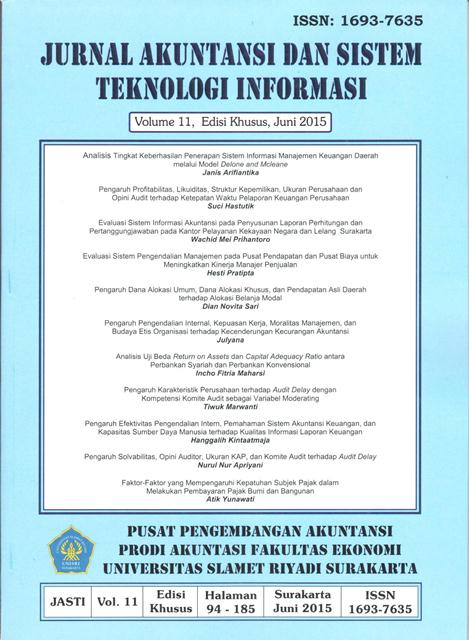PENGARUH EFEKTIVITAS PENGENDALIAN INTERN, PEMAHAMAN SISTEM AKUNTANSI KEUANGAN, DAN KAPASITAS SUMBER DAYA MANUSIA TERHADAP KUALITAS INFORMASI LAPORAN KEUANGAN
Abstract
The issue of transparency and accountability in public finance management is currently a hot thing discussed. The demands of good governance as a new paradigm in assessing the performance of the government requires financial reporting form that can be accounted for. As a form of accountability, financial statements must comply with generally accepted accounting principles and fairly presented. This study examines the effect of the effectiveness of internal control, understanding of financial accounting systems, and human resource capacity of the quality of financial information on the financial statements of DPPKAD Sukoharjo. This research was conducted at the Department of Finance and Asset Management Area/Dinas Pendapatan Pengelolaan dan Aset Daerah (DPPKAD) Sukoharjo. Data collected by the census method by distributing questionnaires to all employees of the financial section DPPKAD Sukoharjo some 75 people. The variables examined in this study include the effectiveness of internal control, understanding of financial accounting systems, human resource capacity and the quality of financial reporting information. The results of research conducted analysis showed that partially, the effectiveness of internal control, understanding of financial accounting systems, and human resource capacity of each positive effect on the quality of financial information on the financial statements DPPKAD Sukoharjo. Additionally jointly effectiveness of internal control, understanding of financial accounting systems, human resource capacity to influence the quality of financial information on the financial statements DPPKAD Sukoharjo. Keywords: internal control, financial accounting systems, capacity of human resource, financial information, financial statementsDownloads
Published
2015-08-26
Issue
Section
Artikel
License
Authors who publish this journal agree to the following terms:
- Authors retain copyright and grant the journal right of first publication with the work simultaneously licensed under a Creative Commons Attribution License that allows others to share the work with an acknowledgement of the work's authorship and initial publication in this journal.
- Authors can separately make additional contractual arrangements for non-exclusive distribution published by the journal (e.g., publish it in a book), with an acknowledgement of its initial publication in this journal.
- Authors are allowed and encouraged to send their work via online (e.g., in the institutional repositories or their website) after published by the journal.










